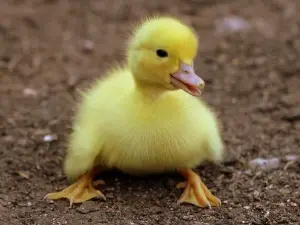
Keeping a close eye on your baby duck will help you quickly figure out if the bird is ill or not. If your bird is lethargic then you can assume that there is something wrong with the bird.
This article explores reasons why your duckling may be lethargic.
Table of Contents
Lethargic duckling:
Baby birds may initially be a bit weak after they hatch but they should perk up soon after this. If your baby duck is lethargic then reasons why this happens include:
Heat stress:
Heat stress can take a toll on anyone, ducklings included. If your baby is left in an environment that is too hot for it, for long periods of time, then the bird may begin to suffer from heat stress.
Signs that indicate that your bird is suffering from heat stress include: lethargy, panting, labored breathing, droopy wings, laying on its side, sitting with its eyes closed, and holding its wings away from its body.
Heat stress can develop in your bird if the temperature of its environment goes above 90°F for extended periods of time.
What to do:
A bird suffering from heat stress can eventually die from this condition if not addressed, taking steps to cool the bird will save it. You can help the bird by firstly getting it out of the sun and placing it in the shade to cool off.
You’d then need to add fresh, clean, and cold water to your bird’s waterers, up the number of waterers as well. Keep the water cold by leaving ice cubes in the water and leaving the waterers in the shade.
Give the bird a pool big enough to get into, swim in, and splash around in. You can use any large container, like a kiddie pool, a repurposed garden tub, or a horse trough for this purpose.
Don’t fill the pool up too high, make sure that the birds can stand while in the pool.
Make sure that the bird’s duck house is well-ventilated at all times.
Give the birds access to water-dense foods like sliced-up strawberries, sliced-up cucumbers, peas, watermelon, and berries. Cool all of these foods before giving them to your bird.
Premature duckling:
Ducklings that have just hatched will not be the strongest but they should come around and gain their strength soon enough. However, birds who hatch prematurely will be weaker for longer.
Premature birds will also need additional care in their early days
What to do:
If the bird has just hatched from its egg then you’d need to start preparing an isolated nest for the bird. Create a makeshift brooder for the bird out of a cardboard box and use a red heat lamp to keep the bird warm.
Using a red heat lamp will keep the bird warm and won’t disturb the bird’s sleep when it’s on.
Clean the bird up and place it in the brooder to keep warm. You can also wrap the bird up in a thin towel and keep it close to your body to share some warmth.
Give the bird sugar water to perk it up a little bit, you may need to syringe feed the bird or feed it using a dropper. If the water stays down then you can feed the bird ground-up crumbed feed mixed in with room temperature water.
When bedtime comes around leave the bird in its brooder and lightly place a light tea towel over the nest. This mimics how ducklings usually sleep, under their mother’s feathers, in the wild.
Feeding issues:
Your bird’s diet will affect how it behaves, a diet that is not appropriate for the bird will make the bird weak and lethargic.
Feeding your bird the incorrect foods, for example, feeding the bird-medicated chick starter feed, will make the bird lethargic. This feed was not designed to be given to ducks, and will not be appropriate for these birds,
What to do:
The bird won’t need to eat for the first 24 hours of its life because the yolk that the bird absorbed while in the egg will sustain it for the 24 hours, but the bird will need to be fed by you after the first 24 hours.
Rather than feeding your baby ducks a medicated chick starter feed, feed your duckling’s waterfowl starter crumbs or unmedicated chick crumbs.
You can buy this feed at agricultural supply shops. You can also boost the bird’s energy levels by feeding the bird boiled-up and mashed-up eggs.
Giving your birds infant vitamins like polyvisol is also recommended.
If you enjoyed this article then you may also be interested in other duck related articles. Here are some articles that you may be interested in: Duck Eggs Not Pipping, Newly Hatched Duckling Problems, Weak Duckling, Duckling Hatched With Unabsorbed Yolk

